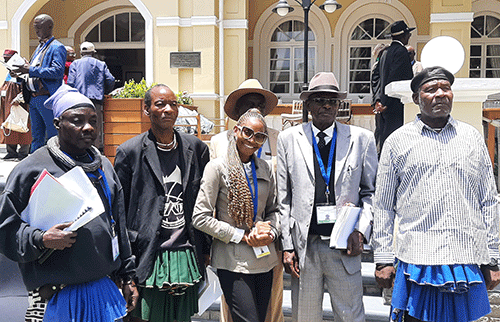SWAKOPMUND – President Hage Geingob has expressed concern over the proliferation of traditional authorities and disputes among them in the country.
Geingob conveyed his message through vice president Nangolo Mbumba during the opening of the 24th annual meeting of the Council of Traditional Leaders, which began in Swakopmund yesterday.
Traditional leaders from all over the country gathered in the town to fulfill their statutory duties and discuss issues concerning their communities.
The president said these mushrooming scenarios create fragmentation and division among Namibians, contrary to the spirit of “One Namibia, One Nation”.
At least nine new traditional authorities have applied for government recognition, a report of the Council of Traditional Leaders handed over to the president shows.
Those seeking recognition are the Muhona Katiti, Ongava and Kai! A Khoe San, Haub-San Hai//Om, Xoms Khoen Hai//Om San community, //Go-AiKhoen, Kokara Hai //Om San, Ondanga and Naro traditional communities.
Additionally, Popular Democratic Movement (PDM) president McHenry Venaani plans to introduce a private member’s bill in the National Assembly to regulate the formal recognition of a Baster traditional authority.
The Bill intends to facilitate the establishment of traditional authorities in urban areas, provided that these areas represent the historical origins of the respective communities.
“Unfortunately, on numerous occasions, the government is dragged into the midst of these avoidable disputes, causing not only divisions among communities, but also consuming time and resources that could be better used on priority matters, such as the war against poverty and disease,” Geingob stressed.
He added that the constant applications for the recognition of new traditional authorities, communities and leaders, if accommodated, may not only become financially unsustainable, but also lead to further tribal divisions within the Namibian House.
The President thus called upon the traditional leaders attending the five-day conference to continue working hand-in-hand with the government to deepen and strengthen peace, unity and inclusive development for all Namibians across traditional authorities.
Also speaking at the opening, Minister of Urban and Rural Development Erastus Uutoni urged all traditional leaders to ensure that customary laws are clear and precise on succession to avoid disputes after the chief or head of a traditional community is no longer present.
“This is one of the issues that places a huge burden on the state, and needs to be addressed urgently. In addition, emphasis should be placed on Section 5 of the Traditional Authorities Act. The provisions dealing with the designation of chiefs or heads of traditional communities should be revisited to curb the proliferation of traditional authorities and the unending leadership succession battles and disputes among them,” he appealed.
The minister likewise said these scenarios create fragmentation and division among people. Succession disputes within traditional authorities can be better addressed by the traditional authorities themselves through applicable customary laws, he reasoned.
No kings and queens
Uutoni further said Namibia does not have kings and queens, and traditional leaders and communities should thus refrain from using titles that are not recognised in Namibia.
He said traditional communities and leaders should utilise traditional titles recognised by the government to ensure that these titles are not diluted or enhanced.
The increased usage of the terms “king and queen” in reference to traditional leaders is constitutionally and legally incorrect, he stressed.
“I wish, in relation to the use of traditional titles, to refer you to section 11 of the Traditional Authorities Act, 2000 (Act 25 of 2000), which means that reference to a traditional title such as Ohamba, Hompa, Ombara, Omukwaniilwa, Gaob, Nkosi, Fumu, or the like is within the Act,” he said.
Therefore, a reference to king or queen is inconsistent with the constitution of Namibia, which establishes a Republic State, meaning that kingdoms are not recognised here.
Uutoni then recommended that members of traditional communities and leaders utilise the traditional title, even when speaking English, to ensure that traditional titles are not diluted or enhanced.
President Hage Geingob clarified that Namibia is a Republic, and not a kingdom. This means that there are no kings and queens in Namibia.
– edeklerk@nepc.com.na
Photo: Mushrooming
Caption:


